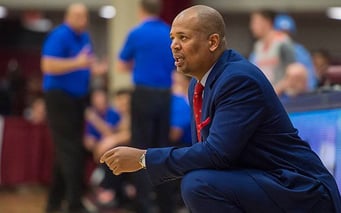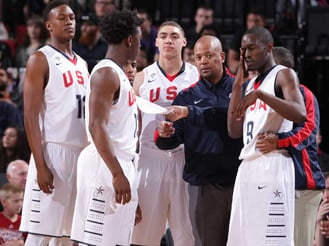Cory Van Dyke
08/17/2020
Basketball Plays,
How to get into Coaching,
coaching,
DeMatha Catholic High School,
Mike Jones,
success
0 Comments
6 Minutes
Morgan Wootten is arguably the top high school basketball coach of all time. In his 46 years at DeMatha Catholic High School, the legendary coach compiled 1,274 wins to just 192 losses, earning an induction into the Naismith Memorial Basketball Hall of Fame in 2000.
It’s why when he retired in 2002, those who closely followed DeMatha’s program were a little weary of 29-year-old Mike Jones taking over the reins of the powerhouse.
“I heard it. Oh, I heard it,” Jones said with a chuckle. “Like a dummy, I probably read too much stuff. I read newspaper articles. Back then there was really no Twitter and stuff like that, but there were message boards that people had. I read all that stuff. I was too young, I wasn’t ready. DeMatha was going to eat me up and spit me out. All that other stuff. I’ve always used that even when I was playing, I supposedly wasn’t good enough and things like that. I’ve always used that as motivation.”
Fast forward 18 years later and Jones has silenced the critics, leading the Stags to sustained dominance at the high school level. This past season, Jones racked up his 500th career victory in the WCAC championship over Paul VI.
Many have followed legends, but few have succeeded. However, Jones’ accomplishments as the head whistle prove it can be done.
“I believe I’m very blessed by God,” Jones said. “I think I’m coaching because that is what I’m supposed to do No. 1. No. 2, I have tremendous support from my school and administration. I have since day one. They have always believed in me and always made sure that if there was anything I absolutely positively needed to be successful that I had it. You can’t talk about great teams without having great players. I’ve had great players. I’ve had players that were talented, I’ve had players that weren’t very talented but worked really hard and became talented. It’s the perfect storm.”
It’s almost like Jones was handcrafted for the position. A star-player at DeMatha himself, Jones played collegiately at Old Dominion University where he averaged 16.5 points per game and led the Monarchs to the NCAA tournament.
Following a professional career with several stints overseas, Jones eventually made his way back to DeMatha as a counselor and assistant coach. It was the start of a coaching career that Jones envisioned when he was still in high school playing under Wootten.
“Because I knew that’s what I wanted to do, I tried to pay attention as much as I could to every coach I ever played for beyond just being a player,” Jones said. “What worked for them in terms of communication? How they approached the game, how they dealt with officials, how they dealt with controversy or bad situations on the team. I tried to pay attention to all of that and how they communicated with their other coaches. I tried to just pull from all those experiences I had and stored them away for whenever I was going to become a coach.”
In those first few years back at DeMatha, Jones grew exponentially as a coach. One of Wootten’s greatest qualities was the way he empowered his assistant coaches to take ownership of large parts of the program. Jones was just one of a handful of talented coaches in the program, giving him the opportunity to continually learn and observe from those around him.
It’s hard to imagine, but if circumstances shaked out a certain way, Jones would have never become the head coach at DeMatha.
“Truth be told, when I first went to DeMatha as coach’s assistant, I figured I would be there for a couple years and then eventually move on to college,” Jones said. “In our minds, coach Wootten was invincible. He was going to coach forever. No one ever really talked about when coach Wootten would retire. Literally after my first year, it became very evident that coach was not going to be coaching for very much longer. At the end of my first year, I think we all assumed that it would go in a certain direction and it would be coach Wootten’s son that would be the head coach.”
Joe Wootten was the heir apparent to his father. That is until he took the head coaching position prior to the 1999-2000 season at rival Bishop O’Connell. It opened the door for Jones to begin questioning if he was ready to follow in the footsteps of Morgan Wootten.
Over the next three years, Jones did everything in his power to make sure he was prepared should the chance come calling. When Wootten eventually called it quits, Jones was tagged as the interim head coach before officially earning the gig.
“I don’t like the word pressure,” Jones said. “I think the culture and environment of DeMatha, pressure is not something we look at it as. We look at it as highly emotional opportunities. I clearly was placed in one of those situations. I was looking forward to it. I was very excited. Being young and dumb, I was probably not too excited, but too confident.”
All of those years as a player and coach under Wootten made Jones the right man for the job. He’s able to build relationships with his players and evolve with the game in the same way that Wootten always demonstrated.
It’s why in the age of social media offers and online mixtapes, Jones has embraced it all and allowed his players to build a brand up to the point where it doesn't take away from the program.
 “Coach Wootten was able to coach in six different decades and be successful,” Jones said. “The thing that I was always impressed by was his ability to adapt. As the game changed, coach Wootten changed. As people changed and society changed, coach Wootten changed. If you think about it, he coached at a time where there were no black players into integration. His ability to do that was always something I wanted to do.
“Coach Wootten was able to coach in six different decades and be successful,” Jones said. “The thing that I was always impressed by was his ability to adapt. As the game changed, coach Wootten changed. As people changed and society changed, coach Wootten changed. If you think about it, he coached at a time where there were no black players into integration. His ability to do that was always something I wanted to do.
“I always wanted to be open-minded to the changes in the game. Always wanted to surround myself with people that didn’t always agree with me. The guys that coach with me, I want guys to bring in fresh and new ideas. I think being able to sustain success is a product of that. We’ve always tried to have some foresight into the changes in the game, the changes in recruiting, the changes in what motivates kids and just try to stay one step ahead of it without losing who we are.”
18 years and 500 wins later, why has Jones never left for a job at the college level? The offers have been there, but he’s found his home at DeMatha.
“Opportunities have come to go to college,” Jones said. “I’ll never say never, but I just believe the influence I have over the kids at the age they are, I have much more influence over them. That’s where I’m supposed to be right now.
“My why is because I believe that it’s part of God’s work to be able to influence young people. I just believe it’s my job to help encourage them and to help young people mature into the people that they are. The game of basketball, definitely the lessons you learn there and in any team sport, really helps you to become a better person in life. That’s why I do it.”
Jones’ influence on the younger generation doesn’t stop at DeMatha, either. In 2004, Jones began coaching with USA Basketball. His extensive work with the U16 National Team allowed him to be named a co-recipient of the 2019 USA Basketball Developmental Coach of the Year award.
“To be honest with you, USA Basketball has been the most influential part of my coaching career in terms of my maturation,” Jones said. “Anytime in any profession where you can surround yourself with the best minds in that field, you have no choice but to become better. USA Basketball has provided me the opportunity to be around the best coaches this country has to offer.”
One of those coaches who has mentored Jones is the renowned Don Showalter. Just what is Showalter’s legacy in USA basketball? He’s known as Mr. Perfect for going 62-0 in FIBA competition at the U16 and U17 level.
Just like Jones was tasked with following in the footsteps of Wootten at DeMatha, he also faced the unenviable task of replacing Showalter as the U16 National Team head coach when Showalter stepped down in 2018. Jones hasn’t missed a beat at USA Basketball, either, leading the U16 team to the FIBA Americas Championship in Brazil in 2019.
 “I tell [Showalter] all the time he is the absolute best and he should be in the basketball Hall of Fame and he will be one day,” Jones said. “His influence over me and his willingness to allow me to learn as much as I can from him, but also empowering me to grow into the coach I have become has truly been amazing. Don Showalter is first and last on any list.”
“I tell [Showalter] all the time he is the absolute best and he should be in the basketball Hall of Fame and he will be one day,” Jones said. “His influence over me and his willingness to allow me to learn as much as I can from him, but also empowering me to grow into the coach I have become has truly been amazing. Don Showalter is first and last on any list.”
Jones has reached the pinnacle of success with championships at the high school level and with USA Basketball. He’s coached NBA players like Victor Oladipo, Quinn Cook, Jerami Grant, Jerian Grant, and Markelle Fultz.
Still, he remains humble in the face of all that he’s accomplished. When asked at the end of the interview if there was anything else he wanted to comment on, Jones made sure to push any credit aside.
“I would say this one thing. We’ve had some really good players and obviously we have the guys who are in the NBA and different things like that from DeMatha,” Jones said. “I would say that I’ve been very lucky, and I will use that term luck. Every single kid who I’ve coached who has gone on to play in the NBA has had one very prevailing quality about themselves and that’s that they work extremely hard.
“Who knows what they would have been had they gone to where else, but never do I want to come across as, ‘Well, they played for me and that’s why they’re in the NBA.’ They’re in the NBA because they worked really hard and we didn’t screw it up.”
More than anything, it’s this humility from Jones that reveals why he’s been able to establish his own legacy in the face of legends.


